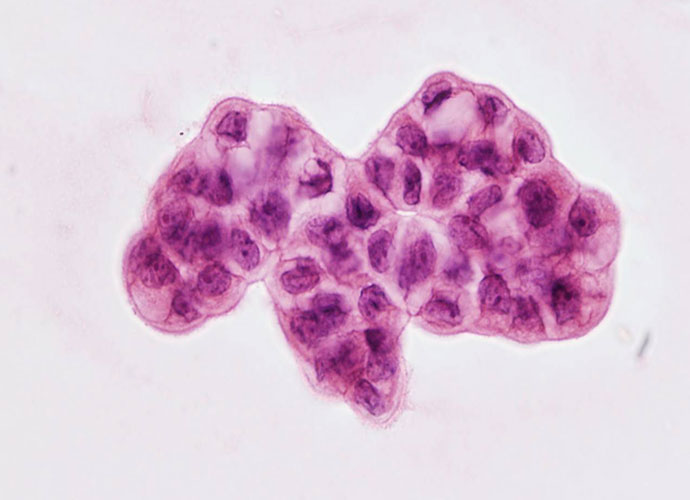Non-neoplastic conditions
Non-neoplastic conditions In many benign disorders, effusions show a non-specific cytologic picture. However, some conditions are characterized by specific cytologic features which may be helpful in the differential diagnosis. Acute serositis Eosinophilic effusions Tuberculosis pleuritis Rheumatoid pleuritis Systemic lupus erithematosus (SLE) Effusions due to pulmonary infarct Reactive mesothelial cells (often) Mitoses Haemosiderinophages Eosinophils (up to […]
Acute serositis
Acute serositis Acute pleuritis, pericarditis and peritonitis are usually the result of a bacterial infection. Bacterial infection of the pleura occurs in the setting of pneumonia, secondarily involving the overlying pleura and resulting in a pleuric empyema. Acute infection of the peritoneal cavity is often secondary to inflammation of or injury to the bowel, as […]
Tuberculosis pleuritis
Tuberculosis pleuritis 80-100% lymphocytes No or few mesothelial cells Pleural effusions in patients with tuberculous pleuritis have a characteristic, but not specific, cytologic appearance. The fluid is turbid and greenish-yellow. Cytologic preparations are highly cellular and composed almost exclusively of dispersed small lymphocytes, which immunophenotyping shows to be T cells. Mesothelial cells and histiocytes are […]
Physiopathology of the effusions
Physiopathology of the effusions The pleural, pericardial and peritoneal cavities are lined by a single layer of flat or cuboidal mesothelial cells called the serosa. In normal conditions these cavities contain only a small amount of fluid, enough to lubrificate the adjacent visceral and parietal surfaces as they move over each other. In disease states, […]
Malignant effusions
Malignant effusions Some tumours have a greater tendency than others to spread to the serosal cavities. The most common causes of malignant pleural effusion are lung cancer in men and breast cancer in women. In some cases, a malignant pleural effusion can be the first manifestation of lung cancer, whereas it is very uncommon for […]
Effusions

Author (V2.0): Francesco Mauri On completion of this section the cytotechnologist should know: the physiopathology of the effusions the collection and preparation methods the role of cytology in effusions the reporting terminology cytologic features of normal mesothelial cells and inflammatory cells cytologic features of atypical mesothelial cells and the causes of mesothelial atypia cytologic features of […]

